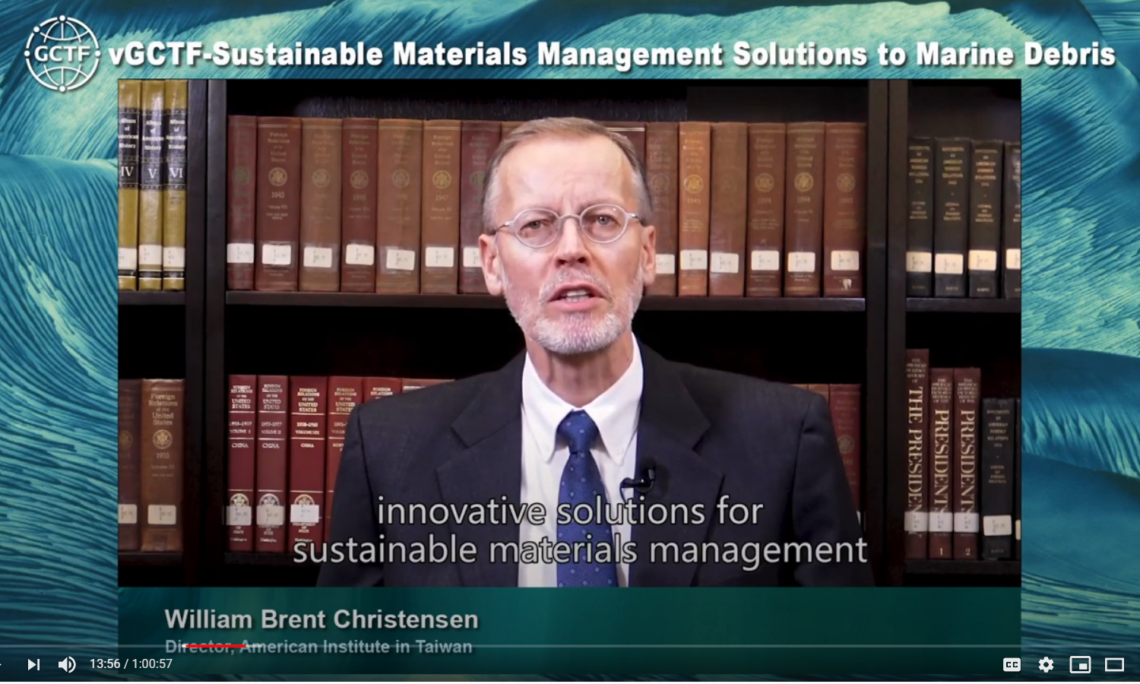OT-2048
November 3, 2020
Remarks by AIT Director Brent Christensen
at the virtual GCTF: Sustainable Materials Management Solutions to Marine Debris
November 3, 2020
(as prepared for delivery)
Deputy Minister Tseng, Representative Izumi, Representative Tielman, distinguished panelists and audience members, it is my pleasure to welcome you to this workshop on sustainable materials management solutions to marine debris held under the Global Cooperation and Training Framework or GCTF.
The United States and Taiwan have a long history of cooperation on environmental matters including the growing challenges of waste management. Environmental protection is a priority for us here at AIT.
During our AIT@40 campaign last year, AIT highlighted December as environment month and hosted a number of activities. These included:
- the opening of the Global Environmental Education Partnership Asia-Pacific Regional Center to improve and promote environmental education around the world.
- hosting NASA senior outreach specialists who conducted a workshop for educators involved in the international science and education program (called GLOBE) that connects students, teachers, and scientists for environmental protection, data collection, and science-related activities; and
- hosting multiple film screenings around Taiwan of A Plastic Ocean, a U.S. documentary on the shocking amount of marine debris in the ocean.
Proper waste disposal is a challenge for all countries, regardless of their stage of development. Of the 8.3 billion metric tons of waste produced worldwide, 6.3 billion—or 76%—is plastic waste. Of that, only nine percent has been recycled. Most of the rest, —79 percent—is accumulating in landfills or is littering the natural environment. Marine debris, mainly consisting of mismanaged plastic waste flowing into the ocean from land-based sources, is another significant challenge. Marine debris also costs the maritime and tourism industries of Indo-Pacific countries hundreds of millions of dollars every year and threatens food security and human health.
The United States is working to find solutions to these complex waste management issues, including marine debris. For example, in October 2018, the United States Congress signed the “Save Our Seas” (S.O.S.) bill into law, directing the U.S. government to increase engagement with countries that contribute the most to the global marine debris problem and find solutions to their waste management issues.
We have gathered a number of experts today to share their experiences on innovative waste management solutions so we can protect our oceans and natural environments. I hope that you can take the lessons that you learn from our workshop and bring them into your own work in an effort to further promote sustainable waste management solutions.
I’ll close by saying that we often talk about the foundation of the U.S.-Taiwan relationship being our shared values. These shared values go beyond our shared democratic values and include our shared values of preserving our planet for future generations by conserving our natural resources, creating innovative economic models and new jobs, and reducing harmful emissions. I hope today’s workshop will help you better understand how to incorporate innovative solutions for sustainable materials management for all waste management, and in particular how we can all work together to solve the global marine debris issue.
I also hope that in the future you will all have the chance to visit Taiwan and see for yourself what a remarkable place it truly is.
Thank you.
















![Video Thumbnail [Recovered]-01](../wp-content/uploads/sites/269/Video-Thumbnail-Recovered-01-1-750x450.jpg)





